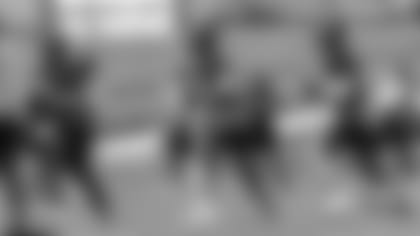ENGLEWOOD, Colo. -- Seven sets of eyes watch every game for myriad infractions. But what the NFL's officials will monitor above all else are violations of all rules involving player safety, which run the gamut from late hits to collisions with defenseless players to lowering the crown of the helmet to making sure that players who don't wear hip and thigh pads are punished.
The health of players and reducing the long-term impact of collisions is now the top priority, noted referee Tony Corrente.
"There is not one competitive aspect of the game that is going to override player safety issues any longer," said Corrente, who visited Dove Valley with his officiating crew Thursday. "Player safety will override any competitive aspect of the game at any time during the game. No getting around it. That is No. 1, forever and ever, for football forever."
It is a new NFL that becomes more enlightened every year as firmer medical data arrives connecting long-term brain trauma to repeated concussions. This year's emphasis was on collisions involving the crown of the helmet.
The only spot on the field where the crown of the helmet can be lowered and involved in a hit is between the offensive tackles within three yards of the line of scrimmage. Get beyond that, and you face a 15-yard unsportsmanlike penalty and further discipline -- including suspension -- depending on the intent of the act. This will apply to all players -- even the one with the football, which will force running backs to re-think how they attack a potential tackler.
"I don't think any of us think it's going to be hard (to officiate), because it is going to be that open field. It's going to be a very obvious kind of play. Keep in mind, it's man-on-man. It's where (the player has) an opportunity to do something different," Corrente said. "It's a conscious decision. It isn't a reaction."
The message to the players is simple: adapt to the new reality, or face punishment. Suspensions like the one-game penalty given to Joe Mays for his helmet-to-helmet hit on Texans quarterback Matt Schaub last September will continue.
That collision was one of the plays the NFL used in its annual rules-change-and-emphasis video presentation to players, which was screened for Denver media Thursday afternoon at Broncos headquarters. Mays got a running start, zoomed into the backfield and drilled Schaub, knocking off his helmet in the process.
The punitive measures toward Mays -- a 15-yard penalty, a one-game suspension without pay and a $50,000 fine -- were issued not just to punish Mays, whose hit also took a chunk of Schaub's earlobe, but to send a message throughout the league. Behavior modification through fear of a substantial financial penalty isn't elegant, but it sends a clear message.
It also forces players to think in that split-second before the collision.
"As game officials looking at the defensive approach, if we see a player doing something with the head -- and lowering his head -- we're looking at that as something that is, quote, 'not necessarily part of the game.' That's what we're trying to get out of the game," Corrente said.
And it's about the safety of all players.
"The player committing the act is as vulnerable as the player he's hitting," Corrente said.
Other rules changes and points of emphasis:
- You can no longer stack more than six players tightly on one side of the snapper at the line of scrimmage during a placekick. This results in a 15-yard penalty.
- A long snapper on placekicks is now considered a "defenseless" player, and collisions with him will be penalized accordingly. The snapper is considered "defenseless" until he lines up to block.
- Thigh pads and knee pads are mandatory. NFL uniform observers will monitor this during warmups and throughout the game. They will be allowed into the bench areas to inform and correct players, Corrente said. The uniform observer will tell the referee when a player is not in compliance. If a player subsequently removes the knee and thigh pads and returns to the game, a 5-yard penalty will be assessed. If he does so again, he will be thrown out of the game.
- A "peel-back" block -- which is when an offensive player cuts back and blocks a defensive player low in front or from the side -- will now result in a 15-yard penalty. These had been legal within the tackle-to-tackle box. This is also subject to potential league discipline.
- Officials will monitor taunting closely -- which includes verbal abuse, although the emphasis will remain on acts like spiking the ball in front of a player from the other team. Verbal taunts will not be considered taunting unless they are personally abusive.
- If you throw a challenge flag in the last two minutes of a half, in overtime or on an unchallengeable play, you will lose a timeout. If no timeouts remain, a 15-yard penalty will be assessed. (But if it's in the last two minutes of a half or overtime, it can be reviewed. So if a replay reversal grants the offense a 50-yard completion, and the team illegally challenged the play, 15 yards will be marked off after the 50-yard gain.)
- The tuck rule has been eliminated. Once the passing motion ends and the actual tuck begins, a loss of the football will be ruled a fumble. Prior to this, the entire tuck motion was considered a pass, which led to the famous incompletion in the "Tuck Rule" Raiders-Patriots divisional-playoff game on Jan. 19, 2002.













